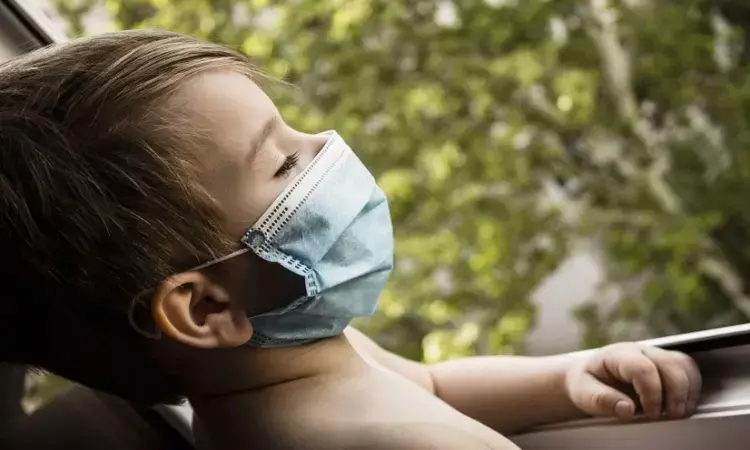- Home
- Medical news & Guidelines
- Anesthesiology
- Cardiology and CTVS
- Critical Care
- Dentistry
- Dermatology
- Diabetes and Endocrinology
- ENT
- Gastroenterology
- Medicine
- Nephrology
- Neurology
- Obstretics-Gynaecology
- Oncology
- Ophthalmology
- Orthopaedics
- Pediatrics-Neonatology
- Psychiatry
- Pulmonology
- Radiology
- Surgery
- Urology
- Laboratory Medicine
- Diet
- Nursing
- Paramedical
- Physiotherapy
- Health news
- Fact Check
- Bone Health Fact Check
- Brain Health Fact Check
- Cancer Related Fact Check
- Child Care Fact Check
- Dental and oral health fact check
- Diabetes and metabolic health fact check
- Diet and Nutrition Fact Check
- Eye and ENT Care Fact Check
- Fitness fact check
- Gut health fact check
- Heart health fact check
- Kidney health fact check
- Medical education fact check
- Men's health fact check
- Respiratory fact check
- Skin and hair care fact check
- Vaccine and Immunization fact check
- Women's health fact check
- AYUSH
- State News
- Andaman and Nicobar Islands
- Andhra Pradesh
- Arunachal Pradesh
- Assam
- Bihar
- Chandigarh
- Chattisgarh
- Dadra and Nagar Haveli
- Daman and Diu
- Delhi
- Goa
- Gujarat
- Haryana
- Himachal Pradesh
- Jammu & Kashmir
- Jharkhand
- Karnataka
- Kerala
- Ladakh
- Lakshadweep
- Madhya Pradesh
- Maharashtra
- Manipur
- Meghalaya
- Mizoram
- Nagaland
- Odisha
- Puducherry
- Punjab
- Rajasthan
- Sikkim
- Tamil Nadu
- Telangana
- Tripura
- Uttar Pradesh
- Uttrakhand
- West Bengal
- Medical Education
- Industry
Study finds elevated cardiac troponin levels in infants with acute SARS-CoV-2 infection

Italy: A recent prospective comparative study has shown elevated troponin levels in about one in three infants infected with SARS-CoV-2. Elevations were revealed to be more common in that group than in infants with other infections. The risk for elevated levels was particularly high in the youngest infants.
"Long-term consequences are unknown and should be carefully followed," the researchers wrote in The Journal of Pediatrics.
One of the primary targets of SARS-CoV-2 infection is the cardiovascular system. Acute myocardial injury has been documented in adults with acute COVID-19, and individuals experiencing multisystem inflammatory syndrome or vaccine-related complications, because of an immune-mediated mechanism. However, there is a lack of research on the extent of myocardial involvement in children with SARS-CoV-2 infection.
To fill this knowledge gap, Andrea Lo Vecchio (Associate Professor), University of Naples “Federico II” and University Hospital Policlinico “Federico II”, Naples, Italy, and colleagues aimed to investigate the specific role of SARS-CoV-2 in inducing elevation of the marker of myocardial injury in infants with acute COVID-19.
For this purpose, the researchers conducted a prospective, multicentric three-arm comparative study from March 2020 to March 2022. It enrolled 152 infants hospitalized for COVID-19, 79 children with acute infections other than SARS-CoV-2, and 71 healthy controls. The primary outcome was the determination of high-sensitivity troponin (hs-cTn) levels.
The study led to the following findings:
- The proportion of children with hs-cTn values above the upper limit of normal (28.9%), and with a three-fold increased value (13.2%) were significantly higher in the COVID-19 group than those in both control groups.
- There was a higher risk of presenting a three-fold increased hs-cTn value in children with SARS-CoV-2 infection compared with either healthy children (odds ratio [OR] 5.23) or those with other infections (OR 11.89).
- In children with COVID-19, hs-cTn elevation was associated with neither clinical nor biochemical characteristics, nor perinatal risk factors, but with an age below three months (p<0.001).
- After adjustment for age, sex, and underlying clinical conditions, elevated hs-cTn was independently associated with COVID-19 in a multivariable regression model.
- All children showed a progressive reduction of hs-cTn until normalization over time, without clinical, ECG or echocardiographic manifestations up to one year of follow-up.
"Infants with acute SARS-CoV-2 infection may show a transient and subclinical alteration of myocardial injury markers, especially in the first months of life," the researchers wrote.
"hs-cTn levels normalized during follow-up and were not tied to cardiac functional impairment; nevertheless, long-term consequences are unknown and should be followed carefully," they concluded.
Limitations included a younger control group than infected children, participants did not undergo cardiac MRI, and minimal myocardial injury could not be ruled out.
Reference:
Lo Vecchio, A., Scarano, S. M., Pierri, L., Salerno, M., Discepolo, V., Giannattasio, A., Buonsenso, D., Farina, A. M., Catzola, A., Poeta, M., Nunziata, F., Bruzzese, E., & Guarino, A. (2023). High Cardiac Troponin Levels in Infants with Acute SARS-CoV-2 Infection: A Prospective Comparative study. The Journal of Pediatrics, 113876. https://doi.org/10.1016/j.jpeds.2023.113876
Dr Kamal Kant Kohli-MBBS, DTCD- a chest specialist with more than 30 years of practice and a flair for writing clinical articles, Dr Kamal Kant Kohli joined Medical Dialogues as a Chief Editor of Medical News. Besides writing articles, as an editor, he proofreads and verifies all the medical content published on Medical Dialogues including those coming from journals, studies,medical conferences,guidelines etc. Email: drkohli@medicaldialogues.in. Contact no. 011-43720751


